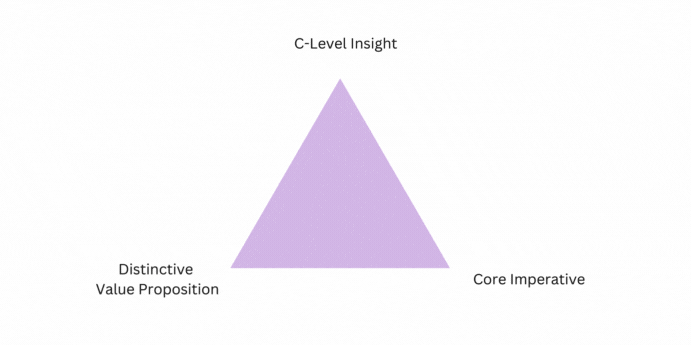Jamal Reimer's Secrets to Breaking into Enterprise Accounts and Closing Mega Deals

A 6-figure deal can change your quarter, but a 7-figure deal?
That can change your whole life.
Just ask Jamal Reimer—closer of a $56,000,000 Oracle deal (yes, you read that right) and the world's leading expert on mega deals.
After 20+ years of selling to enterprise companies, Jamal uncovered the winning strategies for how to close the biggest deals of your life in our most recent Apollo webinar.
I want to save you a decade of trying to figure it out on your own through trial and error.
- Jamal Reimer, Founder of Enterprise Sellers
Keep reading to learn how to land meetings with executives, create a pitch that captivates your most important prospects, and seal the deal on your biggest enterprise accounts.
What is enterprise sales?
So, what's the big deal with enterprise sales? Think of it less like a typical sales transaction and more like a strategic partnership. Enterprise sales, sometimes called complex sales, is the process of selling high-value products or services to large organizations. We're not talking about a quick software subscription; we're talking about solutions that have a massive business impact, often involving multi-year contracts, complex implementations, and a whole lot of stakeholders.
Unlike smaller deals, these aren't quick wins. They're long-term plays that require a deep understanding of the customer's business, challenges, and strategic goals. Success here isn't just about closing a deal—it's about architecting a solution that transforms how a massive company operates.
How enterprise sales differs from SMB and mid-market sales
Selling to a 50-person startup versus a 50,000-person corporation is like playing checkers versus chess. Both are games, but the strategy, complexity, and stakes are worlds apart. Here's how they stack up:
- Sales Cycle: SMB deals can close in days or weeks. Enterprise deals? Think months, or even years. It's a marathon, not a sprint.
- Decision-Makers: In an SMB, you might talk to one or two people. In an enterprise, you're navigating a buying committee of a dozen or more stakeholders from finance, IT, legal, and the business units.
- Deal Size & Complexity: Enterprise contracts are significantly larger and come with custom terms, security reviews, and complex legal hurdles.
- Risk: For an enterprise, a bad purchase decision can cost millions and impact thousands of employees. Your job is to de-risk the decision at every step.
Enterprise sales examples and what makes them successful
Enterprise sales isn't just one thing. It could be selling a new cloud infrastructure platform to a global bank, deploying a new HR software across a national retail chain, or providing a comprehensive cybersecurity solution to a government agency.
What do these all have in common? They solve a massive, mission-critical problem. The seller didn't just pitch a product; they presented a clear business case showing how their solution would drive revenue, cut costs, or mitigate risk on a grand scale. That's the key: you're not selling features, you're selling a strategic outcome.
Break out of the matrix into enterprise sales
What's life like for a run-rate seller?
It's filled with high-volume activity, low-level stakeholders, tiny, time-consuming deals, and small commission checks.
While these things can still be a reality for enterprise sellers, enterprise sales often revolve around the opposite—high-level strategy and intentional action.
Jamal points out that individual contributors often have a great chance at success on paper but the system is gamed to make overperformance nearly impossible.
According to Jamal, the only way to break out of the game and get what you want out of your sales career is to think bigger, think bolder, and set your sights on the mega-deal.
Everything you wanted when you started in sales is on the other side of a single, intentional mega deal.
- Jamal Reimer, Founder of Enterprise Sellers
Leverage your executives to access decision-makers
Breaking into enterprise accounts is a game of chess.
You can't win by focusing on the pawns. You need to go after the queen.
"I've never seen a mega deal done without executive sponsorship. There's too much entropy and mid-level people don't even have the mandate to make big investments," says Jamal.
Executives are the driving force behind any mega deal and if you can't get to them, your deal is over before it's begun.
Here's how you can use advanced filters in Apollo to find verified contact information for C-suite executives:
You have any executive's contact information now, but like many reps, you might feel intimidated to reach out; like you don't know their language or are not worthy of your time.
One of your best strategies will be to leverage your own executives. Go to them with your book of accounts and ask them for any and all mutual connections and support. They are going to be your golden ticket into the room of C-Suites.
Jamal puts it this way: "Don't walk up the mountain. That takes weeks. Go leverage a helicopter to take you to the top of the mountain in 10 minutes. This is the way of the mega dealer—and your executives are your first port of call to be your helicopter."
Subscribe for weekly updates
A Mega Deal Premise has three key components:
- Core imperative: What the C-Suite needs to achieve this fiscal year
- Distinctive value proposition: Your company's secret sauce
- C-level insight: An undiscovered or unappreciated reality about their business
You need to show that your distinctive value prop is the better, faster vehicle to get them to their core imperative, using the C-level insight as the rationale behind why a "yes" makes sense.
Work with your execs to think creatively when you reach out to deliver this information.
"Cold email and cold calling are like super highways that are bumper-to-bumper jam packed. We need to get off of those super highways. We need to go to other channels."
Jamal gives examples of:
- Sending greeting cards
- Delivering physical gifts for special occasions (birthdays, anniversaries, etc.)
- And handwriting notes
Thinking outside the box to capture the attention of busy decision-makers will set you apart from the swaths of people banging at their door.
The enterprise sales process: A step-by-step framework
While every deal is unique, most enterprise sales follow a predictable path. Think of it as a roadmap to guide you through the complexity. Here's a simplified look at the stages:
- Account Identification & Research: Pinpoint high-value accounts and dive deep into their business challenges, strategic initiatives, and key players.
- Executive Mapping & Outreach: Identify the entire buying committee, from champions to blockers, and orchestrate a multi-threaded outreach campaign to gain access.
- Collaborative Discovery: Work with multiple stakeholders to build a comprehensive understanding of their pain points and co-create a vision for the solution.
- Value Proposition & Business Case: Present a tailored solution and a rock-solid business case that proves undeniable ROI to the economic buyer.
- Procurement, Security & Legal: Navigate the final hurdles with the teams designed to scrutinize every detail of the deal.
- Closing & Expansion: Seal the deal and immediately shift focus to delivering value and identifying new opportunities for growth within the account.
Start closing your first enterprise deals with Apollo
Breaking into enterprise accounts isn't about working harder; it's about working smarter. It requires a shift from high-volume tactics to high-impact strategy. You need the right insights to identify key accounts, the right messaging to capture executive attention, and the right tools to manage a complex, multi-threaded sales process.
That's where Apollo comes in. You can build a precise list of your ideal enterprise accounts, find verified contact info for the entire C-suite, and use AI to craft personalized outreach that speaks directly to their strategic imperatives. Stop chasing pawns and start engaging the queens. Get Started with Apollo and build your enterprise pipeline.
The Apollo team regularly features top sales experts like Jamal in webinars that cover everything from email deliverability and cold outreach to key sales trends and tools.
Follow Apollo on LinkedIn to get updates on all future events.
If you'd like to replay the full-length webinar with Josh Garrison and Jamal, you can watch the recording here.
Frequently asked questions about enterprise sales
What is the meaning of enterprise sales?
Enterprise sales means selling high-value, complex products or services to large corporations. It involves long sales cycles, multiple decision-makers, and deals that have a significant impact on the customer's business.
What does an enterprise sales rep do?
An enterprise sales rep is responsible for managing the entire sales process for large accounts. They build relationships with executives, develop complex business cases, navigate procurement and legal, and ultimately close large, strategic deals.
What are enterprise sales examples?
Examples include selling a new CRM platform to a Fortune 500 company, implementing a cloud computing solution for a global logistics firm, or providing a comprehensive cybersecurity package to a major financial institution.
How long does an enterprise sales cycle take?
Enterprise sales cycles are long, typically lasting anywhere from 6 to 18 months, and sometimes even longer. The length depends on the deal's complexity, cost, and the number of stakeholders involved.
What's the difference between enterprise sales and account management?
Enterprise sales focuses on acquiring new large customers (hunting), while account management focuses on nurturing and growing existing customer relationships (farming) to ensure retention and find expansion opportunities.
Share this post
Start using Apollo today
Start your free trial with Apollo today—then use these resources to guide you through every step of the process.
Start using Apollo today
Start your free trial with Apollo today—then use these resources to guide you through every step of the process.
or
By signing up, I agree to Apollo's Terms of Service and Privacy Policy.
Continue Learning
Explore these handpicked resources to deepen your understanding of AI-powered GTM
7 Steps to Advance the Deal in Every Conversation
It's the million-dollar question: how do you close more deals while keeping everything in your pipeline steadily progressing? Jen Allen-Knuth teaches secrets to multi-threading and how to create genuine urgency in a tough buying climate.
How to Create an Email Campaign that Closes Deals
What makes a great email campaign? And what are the best practices for marketing and sales teams looking to expand their reach? Here's the breakdown.
How to Deliver a Winning Sales Pitch
Are your sales pitches delivering the most value, relevant information? And at the right time? Here are 10 tips for maximizing the potential of your sales pitch and improving your conversion rate.
Prospects Still Not Ready to Buy? Here are 6 Lead Nurturing Strategies to Close
Discover 6 effective lead nurturing strategies designed to guide your hesitant prospects seamlessly through the sales funnel.

